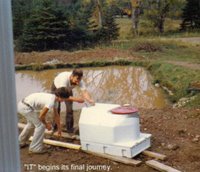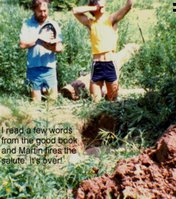
1980 The Composting Toilet Experience ................
Of all the bizarre events in my life, etc etc etc etc.
Well, it was a conspiracy against me I suppose. No paranoia here, it was a conspiracy of events really. I.e. God did it or failed to stop me doing it.
We were newly into our Shubenacadie home. I was a great reader of Harrowsmith, a magazine which tells us how to live properly and greenly. But great strength of character is needed to live the Harrowsmith way. Sadly the pioneer in most of us has leached away leaving us soft and whiny.
But I was still wide open to ways to lead a greener, leaner life.
So when the septic field failed and the toilet flushed not, I was fertile ground. The septic field failed because of clay soil and our contractor's abysmal incompetance. A pox on his head, may camel ticks infest his groin etc etc etc etc etc.
Undaunted I sought alternatives. (-we should have sold up and moved to Halifax and proper sewers-). The Harrowsmith magazine was touting the virtues and advantages of composting toilets.
Sigh ........................................
A composting toilet is a self contained sytem. It stores human bodily waste, in effect saving it, while it slowly transforms "the stuff" into harmless, odourless compost. At some time in the indefinite future it will need emptying, which will, no doubt be a simple and pleasant enough process. In your own tiny mind you disregard any thoughts of anything but having an invironmentally friendly toilet. Maybe, you tell yourself, it'll need attention three or four times in your remaining years. I could go on about the 'thing's' supposed pure goodness but let's, as they say, cut to the chase.
Having decided to go the route we located a local retailer on Windmill Road in Dartmouth. We headed thence ............ The Mini can just, and only just, accomodate a composting toilet!!! It was a difficult fit, no, it was an inpossible fit, but we got it (and us) in and headed homeward with IT.
Next, the installing of IT in the bathroom. It had a throne-like quality only partially diminshed by me cleverly half recessing it into the floor. White and massive with an oddly plum coloured seat and lid it rather intimidated all who beheld it.
It used electricty for its heaters and its extractor fan. The latter was vented through the roof. We prepped it as per instructions, peat moss and water ............... oh yes, installation wasn't for the faint of heart.
We set then set about using it, ............................. solidly and liquidly.
Time passed and as did bodily wastes.
Mother-in-law visited from England and used it and was, I'm sure, severely intimidated by our toilet and its throne-likeness, who wouldn't have been?
It was supposed to be odourless ... it wasn't.
It wasn't supposed to get flies ... it did.
It was supposed to be quiet ... it wasn't.
It did smell, it did get flies and its fan was noisy. The environmentally friendly Huttons were getting disillusioned.

Mutterings about getting another septic system installed OUTDOORS were to be heard.
There was the "Draining Incident". The device began to get more 'water' in it than it was evaporating. Standing on a ladder in the basement, holding a bucket and unscrewing the front panel until the "water" began to run out was one of those jobs the brain stubbornly refuses to forget.
When the bucket was nearly full the panel had to be tightened and the bucket carried outside for emptying into a small pit I'd dug. Inevitably one bucket was spilled in the basement!!! The fluid smelled awful and was awful. The whole job was horribly, noxiously, vilely awful. It was days before I felt clean again.
In the end a new septic system was installed in the front garden and use of The Composting Toilet ended.
Martin and I dug a huge hole (it was a huge toilet!) in our adjacent property. We hauled the 'device' out of the floor, out of the house, across the garden, into the alder bushes and buried it will full military honours. 
I assume it's still there, waiting, in sinister silence, for a future archaeologist.
Me? I'm completely cured of any urge to own one or use one or see one ............................ EVER AGAIN.
Is it all funny now, after a quarter of a century? Ask me again in another twenty five years.




